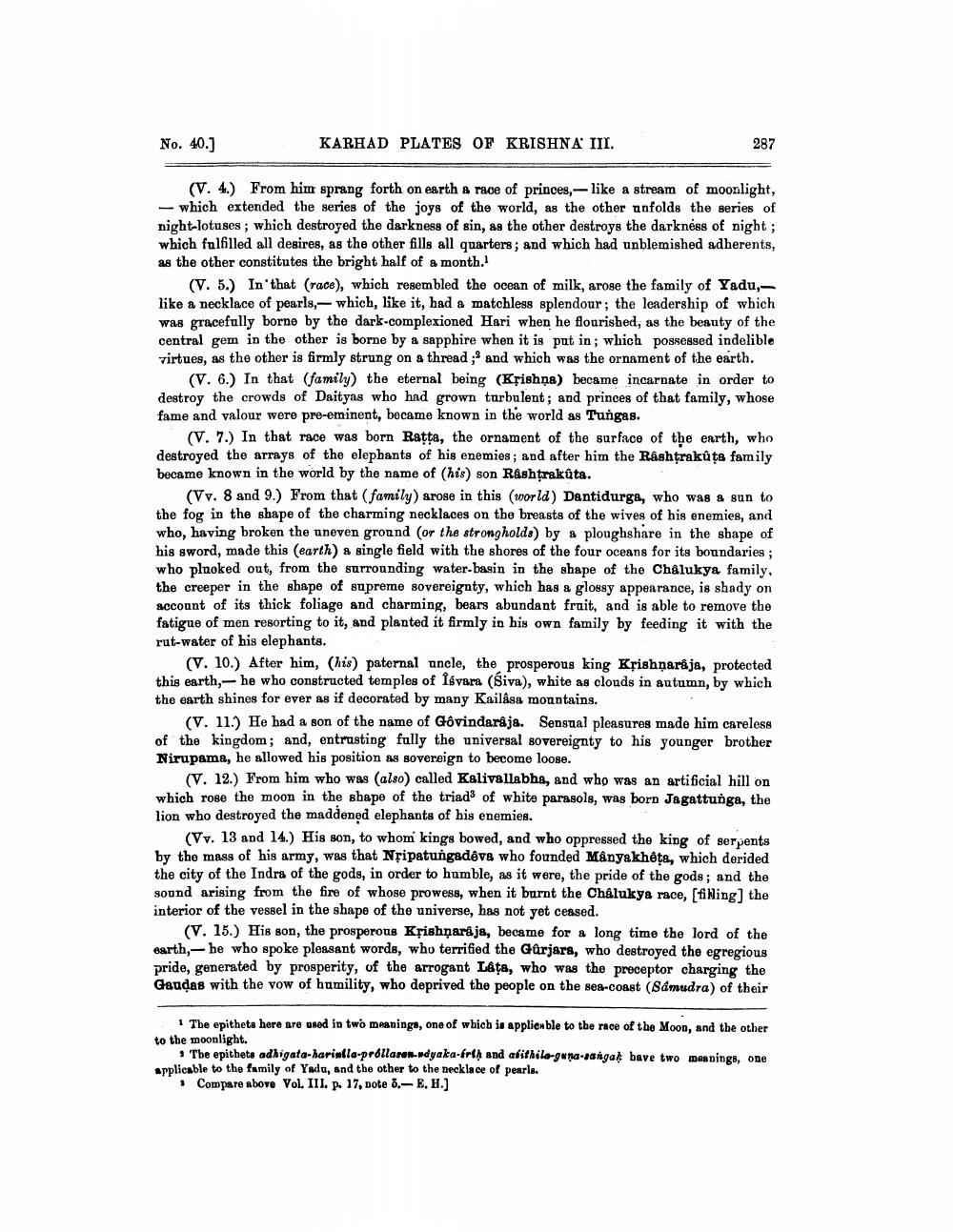________________
No. 40.)
KARHAD PLATES OF KRISHNA III.
287
(V. 4.) From him sprang forth on earth a race of princes, like a stream of moonlight, - which extended the series of the joys of the world, as the other unfolds the series of night-lotuses; which destroyed the darkness of sin, as the other destroys the darkness of night; which fulfilled all desires, as the other fills all quarters; and which had unblemished adherents, as the other constitutes the bright half of a month.
(V. 5.) In that (race), which resembled the ocean of milk, arose the family of Yadu, like a necklace of pearls - which, like it, had a matchless splendour; the leadership of which was gracefully borne by the dark-complexioned Hari when he flourished, as the beauty of the central gem in the other is borne by a sapphire when it is put in; which possessed indelible virtues, as the other is firmly strung on a thread; and which was the ornament of the earth.
(V. 6.) In that (family) the eternal being (Kộishna) became incarnate in order to destroy the crowds of Daityas who had grown turbulent; and princes of that family, whose fame and valour were pre-eminent, became known in the world as Tungas.
(V. 7.) In that race was born Ratta, the ornament of the surface of the earth, who destroyed the arrays of the elephants of his enemies; and after him the Rashtrakûţa family became known in the world by the name of (his) son Råshtrakata.
(Vy. 8 and 9.) From that (family) arose in this world) Dantidurga, who was a sun to the fog in the shape of the charming necklaces on the breasts of the wives of his enemies, and who, having broken the uneven ground (or the strongholds) by a ploughshare in the shape of his sword, made this earth) a single field with the shores of the four oceans for its boundaries; who plooked out, from the surrounding water-basin in the shape of the Chalukya family, the creeper in the shape of supreme sovereignty, which has a glossy appearance, is shady on account of its thick foliage and charming, bears abundant fruit, and is able to remove the fatigue of men resorting to it, and planted it firmly in his own family by feeding it with the rut-water of his elephants.
(V. 10.) After him, (his paternal uncle, the prosperous king Kțishnaraja, protected this earth, he who constructed temples of Isvara (Siva), white as clouds in autumn, by which the earth shines for ever as if decorated by many Kailasa mountains.
(V. 11.) He had a son of the name of Govindaraja. Sensual pleasures made him careless of the kingdom; and, entrusting fully the universal sovereignty to his younger brother Nirupama, he allowed his position as sovereign to become loose.
(V. 12.) From him who was (also called Kalivallabha, and who was an artificial hill on which rose the moon in the shape of the triads of white parasols, was born Jagattunga, the lion who destroyed the maddened elephants of his enemies.
(Vv. 13 and 14.) His son, to whom kings bowed, and who oppressed the king of serpents by the mass of his army, was that Mripatungadhva who founded Manyakheta, which derided the city of the Indra of the gods, in order to humble, as it were, the pride of the gods; and the sound arising from the fire of whose prowess, when it burnt the Chalukya race, (fiNing) the interior of the vessel in the shape of the universe, has not yet ceased.
(V. 15.) His son, the prosperous Krishnaraja, became for a long time the lord of the earth, he who spoke pleasant words, who terrified the Gürjara, who destroyed the egregious pride, generated by prosperity, of the arrogant Láța, who was the preceptor charging the Gaudas with the vow of humility, who deprived the people on the sea-coast (Samudra) of their
The epitheta here are used in two meanings, one of which is applicable to the race of the Moon, and the other to the moonlight.
The epitheta adhigata-harinlla-prollason-dyaka-frch and afithila-guna-sangat bave two mendings, one applicable to the family of Yada, and the other to the necklace of pearls.
1 Compare above Vol. III. p. 17, note .-E. H.)




